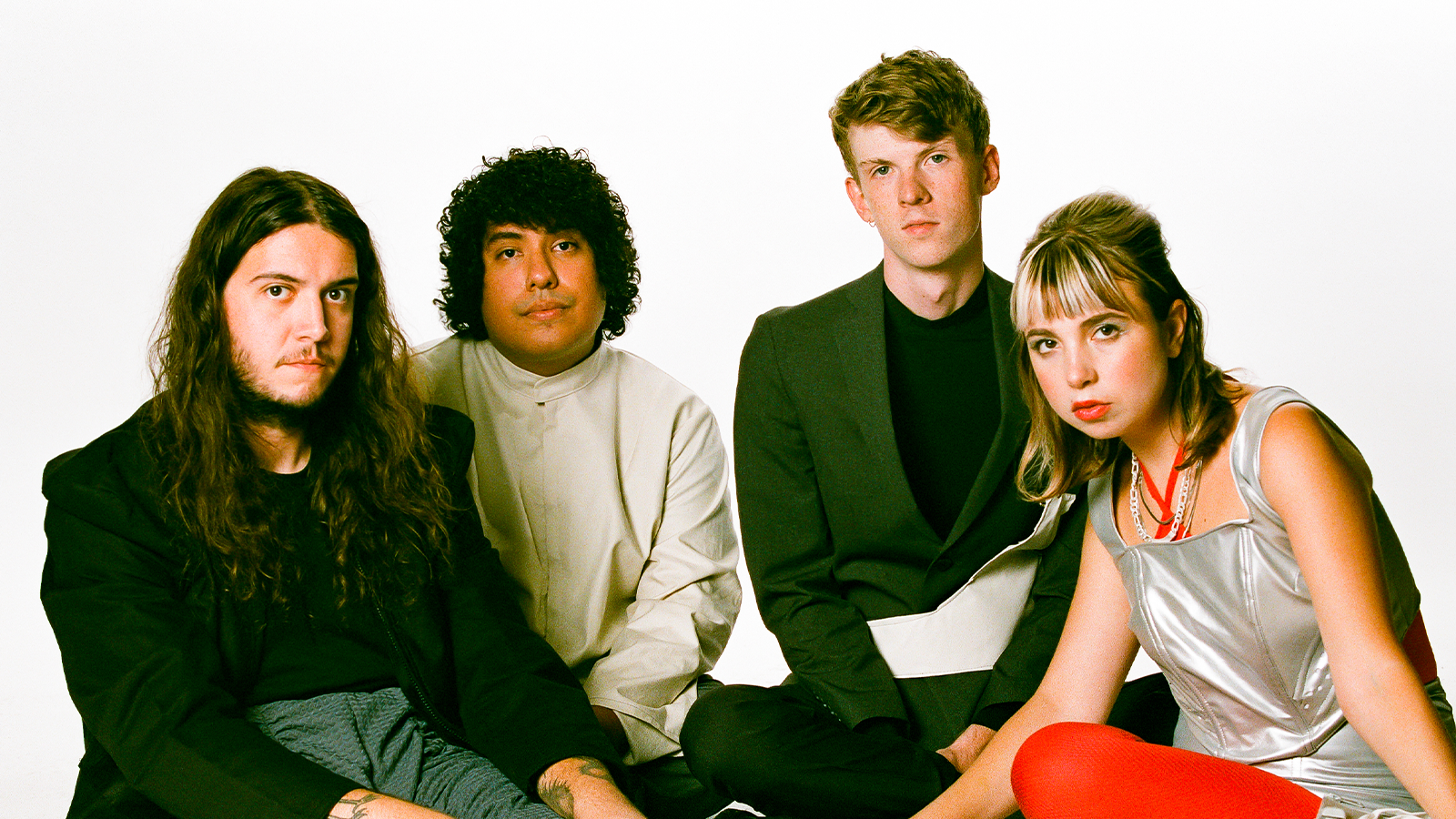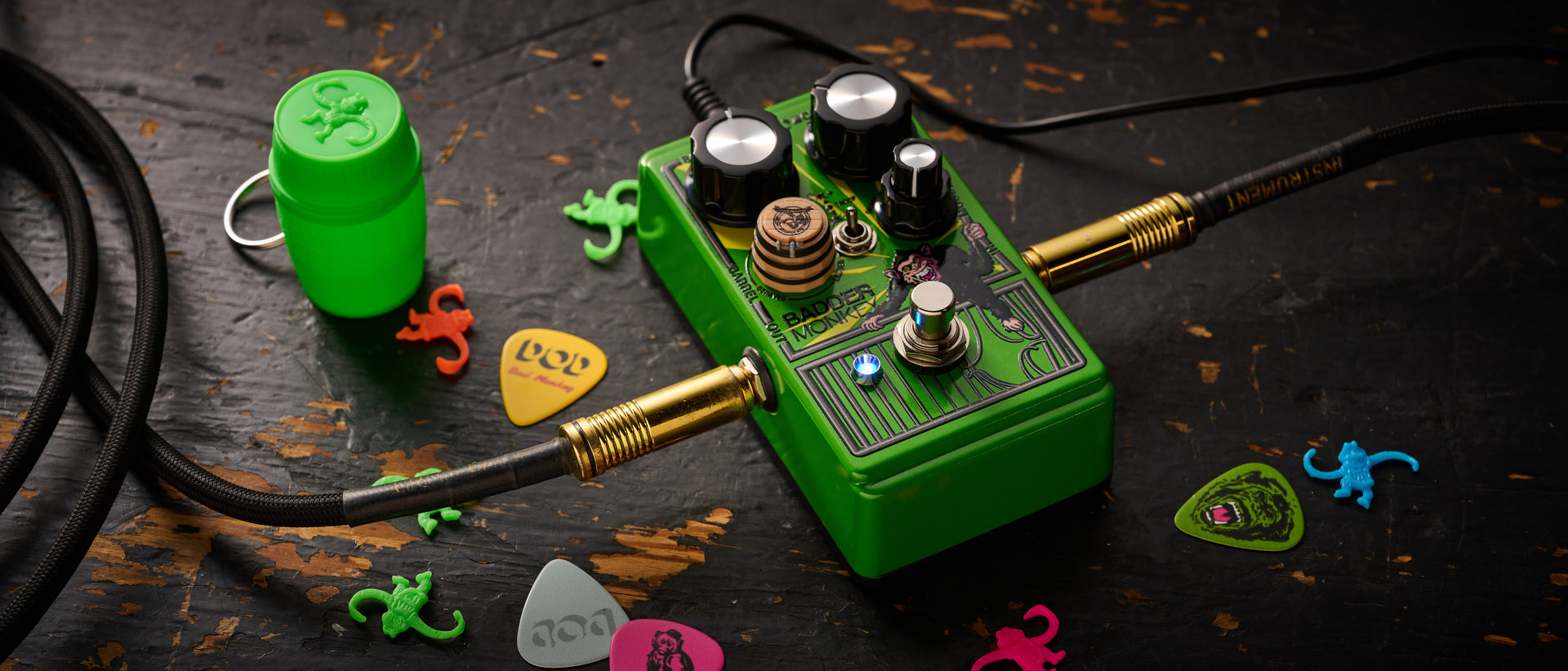Beach Bunny: “The songs resonated with me a lot, but I’m happy to be on the other side of them”
Behind its shimmery, space-themed sheen, Beach Bunny’s second album is an emotional rollercoaster. Australian Guitar takes a ride

In announcing Emotional Creature, the second full-length effort from Chicago power-pop outfit Beach Bunny, frontwoman Lili Trifilio – who started the band in 2015 as her solo bedroom “pop project” – explained that, over the course of the pandemic, she’d grown alongside her songs. “Some of [the tracks on Emotional Creature] were written in various stages of life,” she said, “and I think as we go through different experiences and hardships, you come out stronger.”
By proxy of its gestation across such a formative time in Trifilio’s life – the cerebral rollercoaster that is the transition from one’s early twenties, which is effectively just “being a teenager, but also being able to get sloshed”, into the soul-warping dredges of adulthood – Emotional Creature is much more introspective, contemplative and – for lack of a better term – “deeper” than its predecessor, 2020’s Honeymoon.
It certainly didn’t help that Honeymoon came out just a month before the pandemic took shape, of course. That record landed in February of 2020, when everything was coming up Beach Bunny. Over the year prior, they’d galvanised their lineup (with the addition of permanent bassist Anthony Vaccaro, joining Trifilio on vocals and rhythm guitar, Matt Henkels on lead and Jon Alvarado on drums), signed to revered indie label Mom + Pop, and won the hearts of a burgeoning new generation of power-pop fanatics. The pandemic, naturally, put a bright blue flame to Beach Bunny’s perfectly constructed house of cards.
In sorting through the wreckage, Trifilio learnt a lot about herself too. She discovered new ways to explore her creativity, new inspiration to mine from and new techniques to master. As we (very impatiently) wait for Beach Bunny to announce an Australian tour in support of Emotional Creature, Australian Guitar caught up with Trifilio to learn how all of the above went into making the record such a riveting listen.
How did you find that your emotional growth translated into your growth as a songwriter?
I think in general, most of my writing comes from personal experiences. So maybe part of it has to do with just growing up a little bit more – just being in my mid-20s and having lived more, where Honeymoon was still in my late teen years and early 20s. So just collecting new experiences, and finding a broader depth of topics to write about, rather than just sad breakup songs.
So in having written songs across these different formative moments, when you look at the record as one overarching body of work, do you feel connected to songs in different ways?
Yeah, I think so. I think now that it’s been so long between writing the album and actually putting it out, it feels... I don’t know, it kind of feels like I can let go of a lot of those experiences. It’s always interesting because when a song comes out, it becomes more like “the people’s song” than my song, because everyone’s going to interpret and apply songs to whatever they see fit. So yeah, the songs definitely resonated with me a lot at certain points in life, but I’m happy to be on the other side of a lot of those experiences.
I’m curious, too, did any of that growth play into the way you approached the guitar on this record?
So over the pandemic, I guess my lockdown hobby was making little beats and stuff on the computer, which I hadn’t really done before. And so when it came to making this album, I definitely wanted to include some synths. I don’t think there had ever been anything like that on our other songs, so that was a cool learning curve, for sure.
All the latest guitar news, interviews, lessons, reviews, deals and more, direct to your inbox!
‘Gravity’ is such a cool little interlude.
Yeah, that was definitely one of those things where I really wanted to include something like the beats I was making in lockdown – maybe as some kind of homage to that time, but it also fit the spacey theme.
There are more songs that really push that envelope, as far as what people expect Beach Bunny to sound like. After I listened to the album for the first time, I kept going back to ‘Scream’ – it’s such a musical plot-twist.
That one was very difficult to write [laughs]. It was very outside my comfort zone, in terms of song structure. I kind of just had the guitar part, and trying to build around that was quite a challenge.
Did you feel more confident in experimenting with stuff like that in the studio?
I think so. Maybe having the space to really step back and take that time to learn a new instrument, it made me feel more creative. I mean, there’s not really an audience in the studio, but I still had to play in front of my bandmates and the producer – and I felt like my skills were good enough that I wasn’t going to just, you know, mess up every note. So yeah, it was fun. It makes me want to try to experiment more and learn a little bit more on the next record, too.
I was reading about how when you went into the studio with Sean [O’Keefe, producer], you developed this kind of “bigger is better” mindset. Was it exciting to explore a more expansive tonal palette?
Yeah, definitely. And Sean is just very great at what he does – he provides the space and the resources, and the freedom to do that. It just felt like a really good environment to try new things in.
What guitars were you shredding on for this one?
I play a Tele live, so I mostly used that, and there was also a Strat in the studio that got used a little bit. My bandmate Matt [Henkels], who plays guitar, I believe he used a Tele and… Maybe a Jazzmaster? Or a Jaguar? It was an offset! He also had a lot of pedals, as did our bassist [Anthony Vaccaro] – they both brought a lot of gear that we could use to filter sounds through and stuff like that. I myself am not the biggest gear expert, but luckily they fill in the gaps, and if I abstractly explain the idea of what I’m looking for, they usually get what I’m saying and can figure out how to make that happen.
What is it about that Tele that really pops your corn?
Okay so my Tele is pink, so aesthetically, it’s very cute [laughs]. But apart from that, I think as a mostly rhythm-based guitarist, I like it when all the chords sound really full. And with the Tele, when I go to play lead parts – both live and in the studio – it doesn’t feel like I do all these other things and make all these adjustments in the background to get it to sound level. And since most of the time I am singing and playing at the same time, it’s just a very comfortable and very reliable guitar.
Is there anything else the great guys, gals and non-binary pals out there oughta know about Emotional Creature?
Well, I recently listened to it again after not hearing it for a while, and I think the biggest takeaway I got from that experience was that, you know, we’re all human beings – we all feel the full spectrum of human emotions, in our own unique ways and forms. I feel like it’s easy to feel shame over having having those big emotions, but that’s just part of life. It’s okay to feel things.

Ellie Robinson is an Australian writer, editor and dog enthusiast with a keen ear for pop-rock and a keen tongue for actual Pop Rocks. Her bylines include music rag staples like NME, BLUNT, Mixdown and, of course, Australian Guitar (where she also serves as Editor-at-Large), but also less expected fare like TV Soap and Snowboarding Australia. Her go-to guitar is a Fender Player Tele, which, controversially, she only picked up after she'd joined the team at Australian Guitar. Before then, Ellie was a keyboardist – thankfully, the AG crew helped her see the light…
